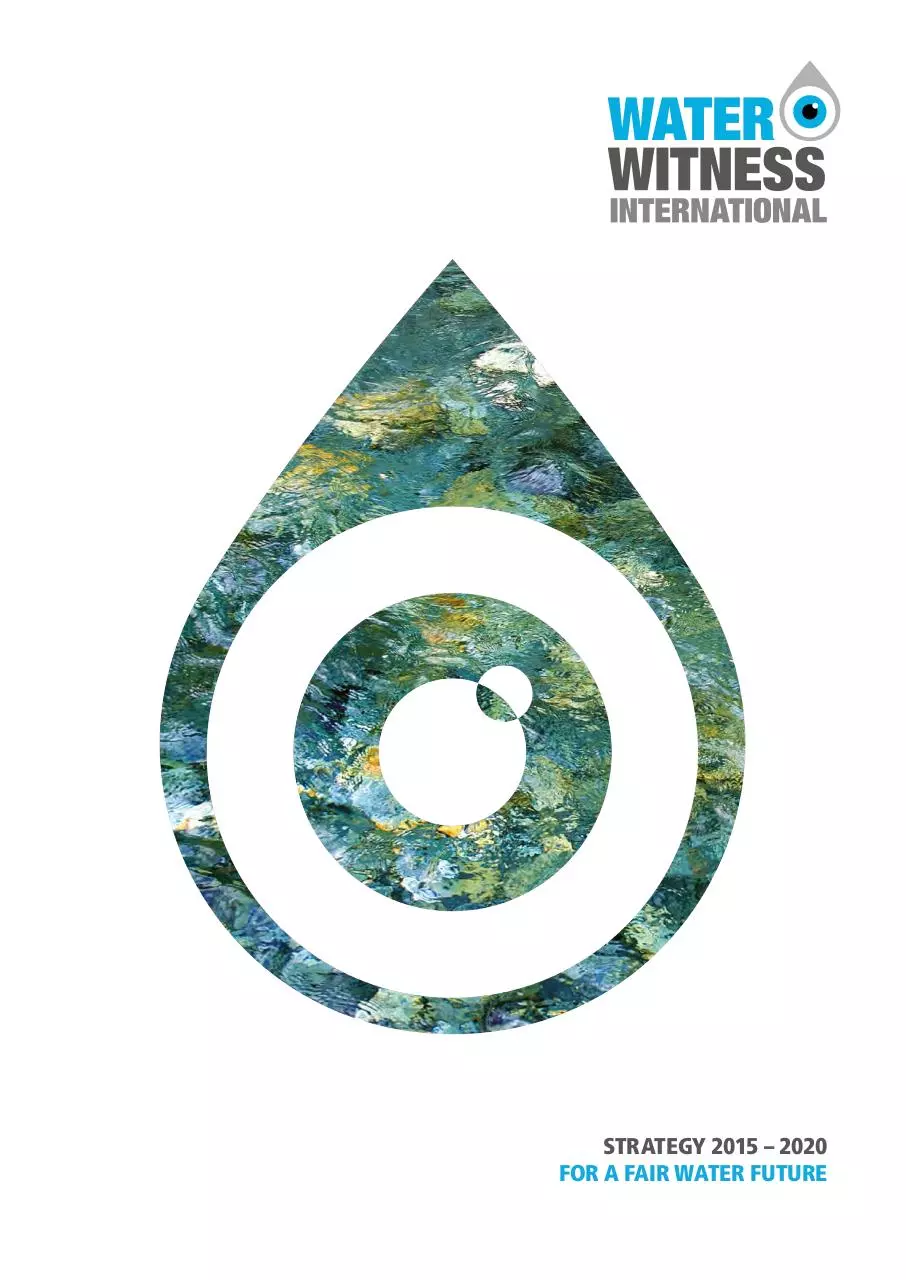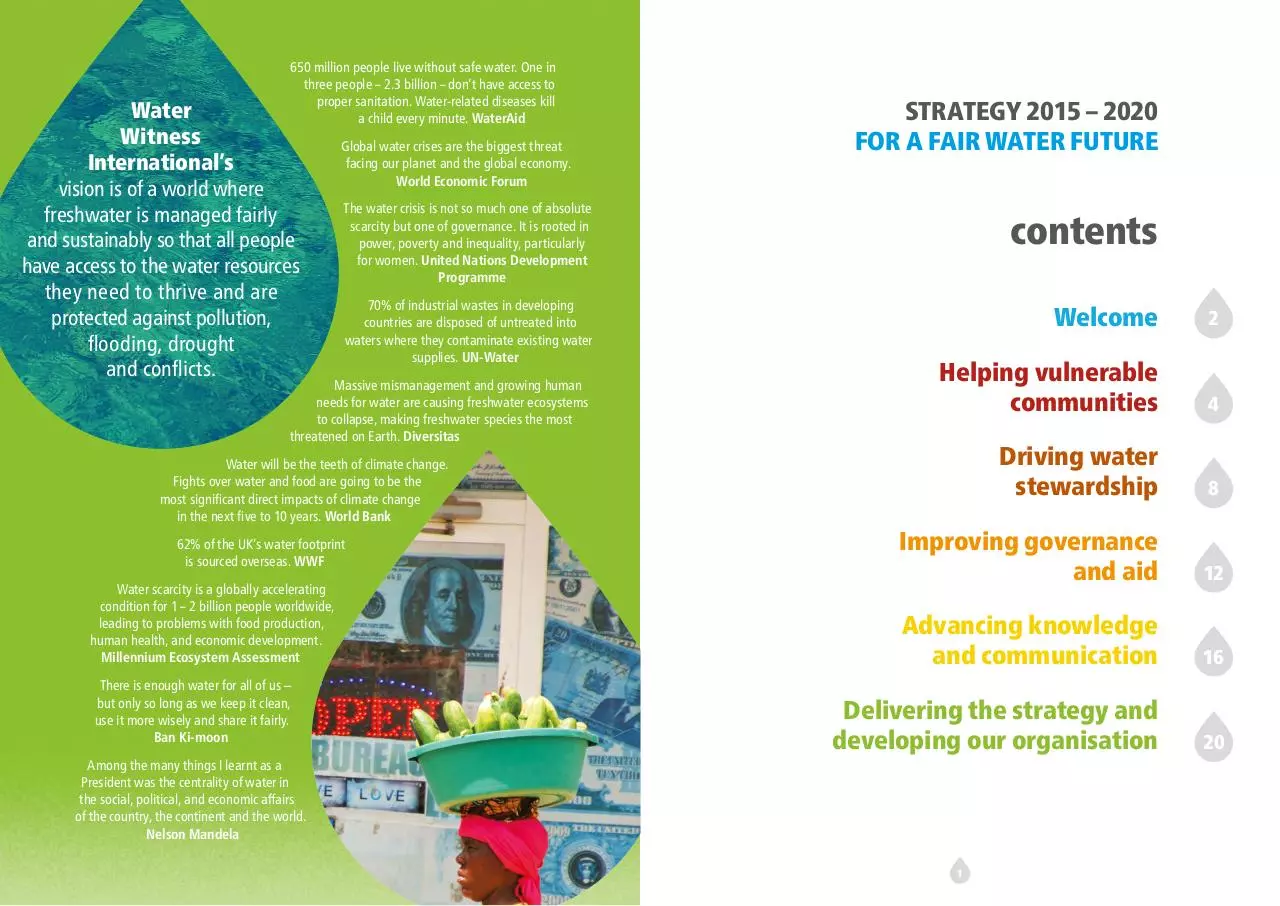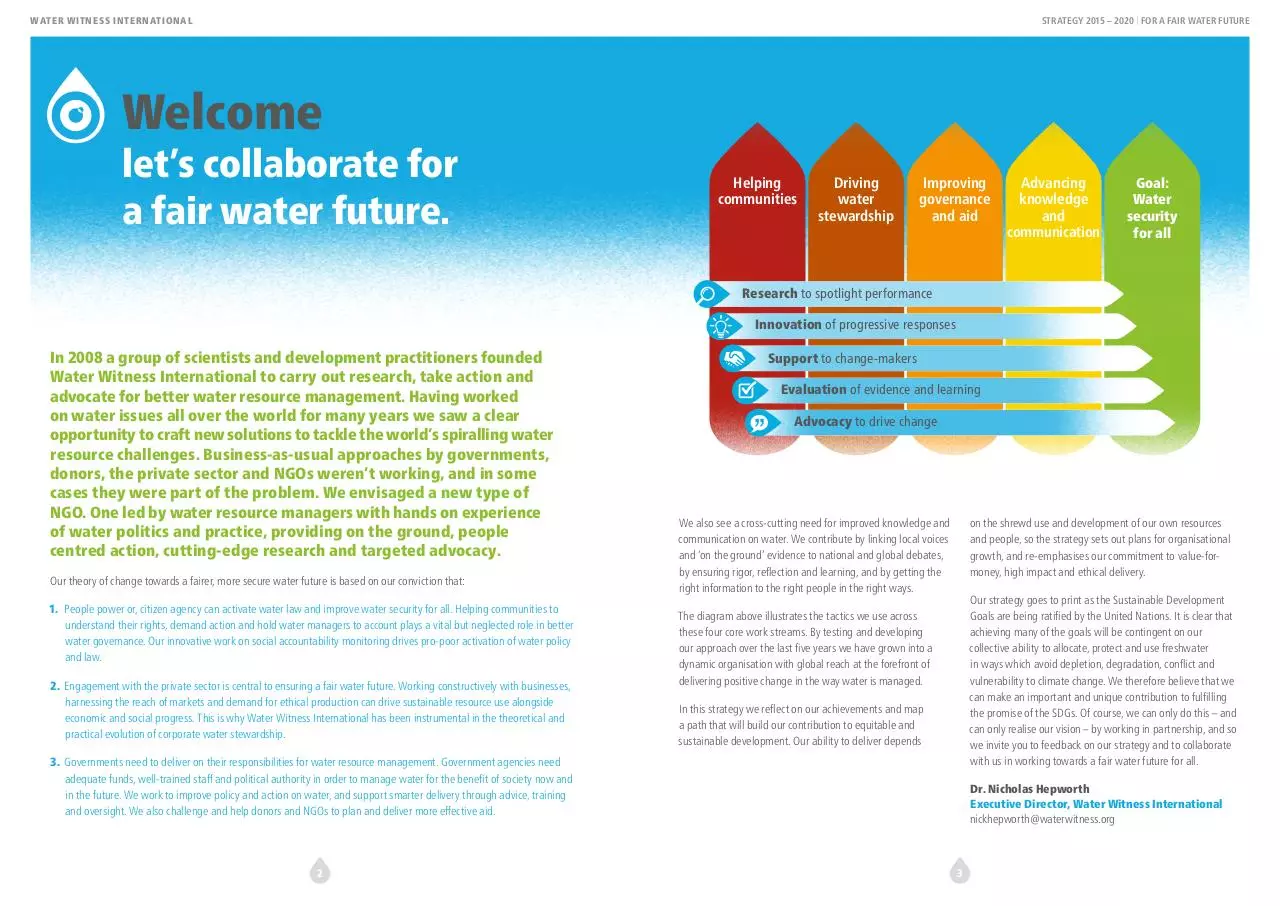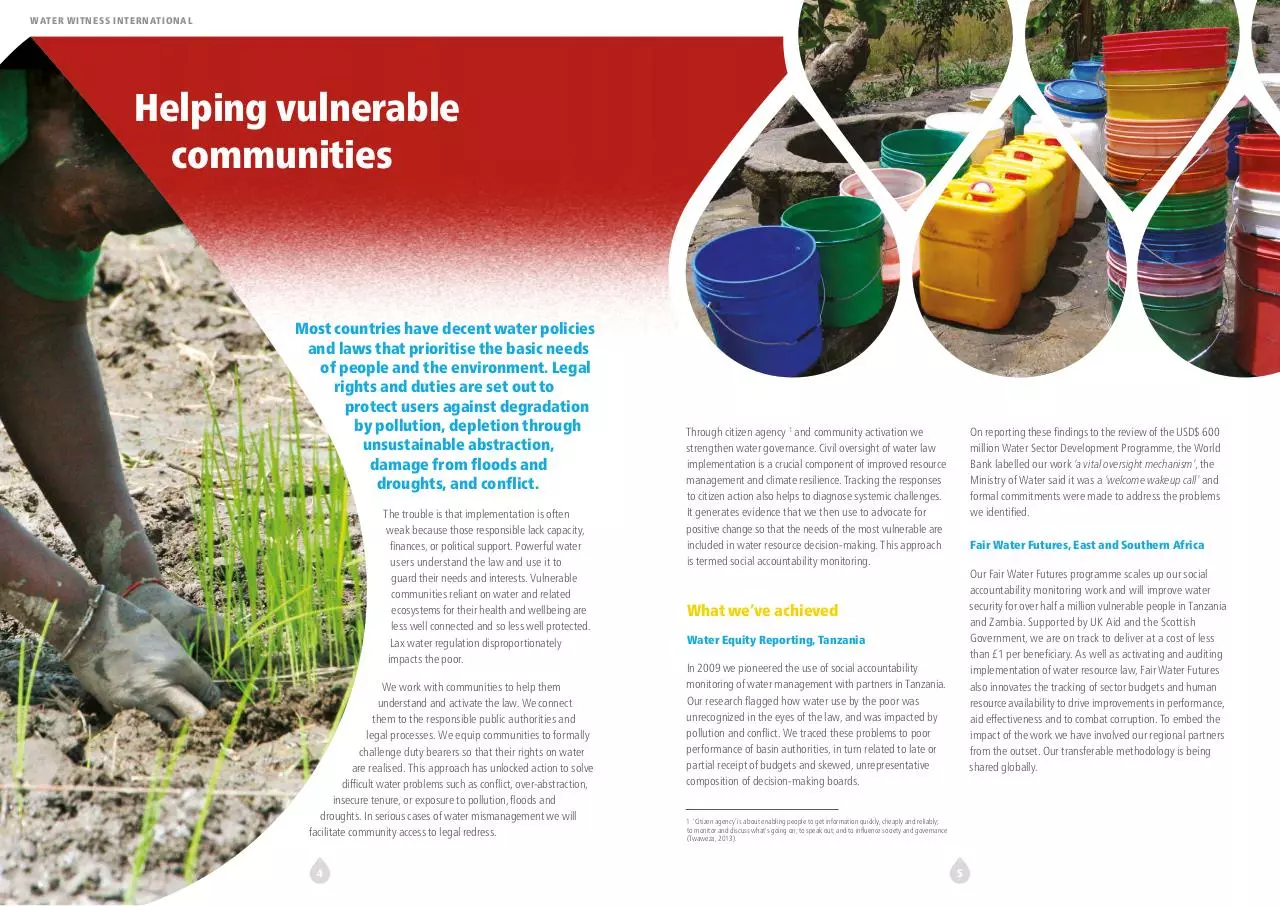WWI strategy2015i (PDF)
File information
This PDF 1.7 document has been generated by Adobe InDesign CC 2015 (Macintosh) / Adobe PDF Library 15.0, and has been sent on pdf-archive.com on 24/02/2016 at 11:12, from IP address 31.50.x.x.
The current document download page has been viewed 668 times.
File size: 9.34 MB (15 pages).
Privacy: public file





File preview
STRATEGY 2015 – 2020
FOR A FAIR WATER FUTURE
650 million people live without safe water. One in
three people – 2.3 billion – don’t have access to
proper sanitation. Water-related diseases kill
a child every minute. WaterAid
Water
Witness
International’s
vision is of a world where
freshwater is managed fairly
and sustainably so that all people
have access to the water resources
they need to thrive and are
protected against pollution,
flooding, drought
and conflicts.
Global water crises are the biggest threat
facing our planet and the global economy.
World Economic Forum
STRATEGY 2015 – 2020
FOR A FAIR WATER FUTURE
The water crisis is not so much one of absolute
scarcity but one of governance. It is rooted in
power, poverty and inequality, particularly
for women. United Nations Development
Programme
contents
70% of industrial wastes in developing
countries are disposed of untreated into
waters where they contaminate existing water
supplies. UN-Water
Welcome
2
Helping vulnerable
communities
4
Driving water
stewardship
8
Improving governance
and aid
12
Advancing knowledge
and communication
16
Delivering the strategy and
developing our organisation
20
Massive mismanagement and growing human
needs for water are causing freshwater ecosystems
to collapse, making freshwater species the most
threatened on Earth. Diversitas
Water will be the teeth of climate change.
Fights over water and food are going to be the
most significant direct impacts of climate change
in the next five to 10 years. World Bank
62% of the UK’s water footprint
is sourced overseas. WWF
Water scarcity is a globally accelerating
condition for 1 – 2 billion people worldwide,
leading to problems with food production,
human health, and economic development.
Millennium Ecosystem Assessment
There is enough water for all of us –
but only so long as we keep it clean,
use it more wisely and share it fairly.
Ban Ki-moon
Among the many things I learnt as a
President was the centrality of water in
the social, political, and economic affairs
of the country, the continent and the world.
Nelson Mandela
1
STRATEGY 2015 – 2020 | FOR A FAIR WATER FUTURE
WATER WITNESS INTERNATIONAL
Welcome
let’s collaborate for
a fair water future.
Helping
communities
Driving
water
stewardship
Improving
governance
and aid
Advancing
knowledge
and
communication
Goal:
Water
security
for all
Research to spotlight performance
Innovation of progressive responses
In 2008 a group of scientists and development practitioners founded
Water Witness International to carry out research, take action and
advocate for better water resource management. Having worked
on water issues all over the world for many years we saw a clear
opportunity to craft new solutions to tackle the world’s spiralling water
resource challenges. Business-as-usual approaches by governments,
donors, the private sector and NGOs weren’t working, and in some
cases they were part of the problem. We envisaged a new type of
NGO. One led by water resource managers with hands on experience
of water politics and practice, providing on the ground, people
centred action, cutting-edge research and targeted advocacy.
Our theory of change towards a fairer, more secure water future is based on our conviction that:
1. People power or, citizen agency can activate water law and improve water security for all. Helping communities to
understand their rights, demand action and hold water managers to account plays a vital but neglected role in better
water governance. Our innovative work on social accountability monitoring drives pro-poor activation of water policy
and law.
2. Engagement with the private sector is central to ensuring a fair water future. Working constructively with businesses,
harnessing the reach of markets and demand for ethical production can drive sustainable resource use alongside
economic and social progress. This is why Water Witness International has been instrumental in the theoretical and
practical evolution of corporate water stewardship.
Support to change-makers
Evaluation of evidence and learning
Advocacy to drive change
We also see a cross-cutting need for improved knowledge and
communication on water. We contribute by linking local voices
and ‘on the ground’ evidence to national and global debates,
by ensuring rigor, reflection and learning, and by getting the
right information to the right people in the right ways.
on the shrewd use and development of our own resources
and people, so the strategy sets out plans for organisational
growth, and re-emphasises our commitment to value-formoney, high impact and ethical delivery.
Our strategy goes to print as the Sustainable Development
Goals are being ratified by the United Nations. It is clear that
achieving many of the goals will be contingent on our
collective ability to allocate, protect and use freshwater
in ways which avoid depletion, degradation, conflict and
vulnerability to climate change. We therefore believe that we
can make an important and unique contribution to fulfilling
the promise of the SDGs. Of course, we can only do this – and
can only realise our vision – by working in partnership, and so
we invite you to feedback on our strategy and to collaborate
with us in working towards a fair water future for all.
The diagram above illustrates the tactics we use across
these four core work streams. By testing and developing
our approach over the last five years we have grown into a
dynamic organisation with global reach at the forefront of
delivering positive change in the way water is managed.
In this strategy we reflect on our achievements and map
a path that will build our contribution to equitable and
sustainable development. Our ability to deliver depends
3. Governments need to deliver on their responsibilities for water resource management. Government agencies need
adequate funds, well-trained staff and political authority in order to manage water for the benefit of society now and
in the future. We work to improve policy and action on water, and support smarter delivery through advice, training
and oversight. We also challenge and help donors and NGOs to plan and deliver more effective aid.
2
Dr. Nicholas Hepworth
Executive Director, Water Witness International
nickhepworth@waterwitness.org
3
WATER WITNESS INTERNATIONAL
Helping vulnerable
communities
Most countries have decent water policies
and laws that prioritise the basic needs
of people and the environment. Legal
rights and duties are set out to
protect users against degradation
by pollution, depletion through
unsustainable abstraction,
damage from floods and
droughts, and conflict.
The trouble is that implementation is often
weak because those responsible lack capacity,
finances, or political support. Powerful water
users understand the law and use it to
guard their needs and interests. Vulnerable
communities reliant on water and related
ecosystems for their health and wellbeing are
less well connected and so less well protected.
Lax water regulation disproportionately
impacts the poor.
We work with communities to help them
understand and activate the law. We connect
them to the responsible public authorities and
legal processes. We equip communities to formally
challenge duty bearers so that their rights on water
are realised. This approach has unlocked action to solve
difficult water problems such as conflict, over-abstraction,
insecure tenure, or exposure to pollution, floods and
droughts. In serious cases of water mismanagement we will
facilitate community access to legal redress.
4
Through citizen agency 1 and community activation we
strengthen water governance. Civil oversight of water law
implementation is a crucial component of improved resource
management and climate resilience. Tracking the responses
to citizen action also helps to diagnose systemic challenges.
It generates evidence that we then use to advocate for
positive change so that the needs of the most vulnerable are
included in water resource decision-making. This approach
is termed social accountability monitoring.
On reporting these findings to the review of the USD$ 600
million Water Sector Development Programme, the World
Bank labelled our work ‘a vital oversight mechanism’, the
Ministry of Water said it was a ‘welcome wakeup call’ and
formal commitments were made to address the problems
we identified.
Fair Water Futures, East and Southern Africa
Our Fair Water Futures programme scales up our social
accountability monitoring work and will improve water
security for over half a million vulnerable people in Tanzania
and Zambia. Supported by UK Aid and the Scottish
Government, we are on track to deliver at a cost of less
than £1 per beneficiary. As well as activating and auditing
implementation of water resource law, Fair Water Futures
also innovates the tracking of sector budgets and human
resource availability to drive improvements in performance,
aid effectiveness and to combat corruption. To embed the
impact of the work we have involved our regional partners
from the outset. Our transferable methodology is being
shared globally.
What we’ve achieved
Water Equity Reporting, Tanzania
In 2009 we pioneered the use of social accountability
monitoring of water management with partners in Tanzania.
Our research flagged how water use by the poor was
unrecognized in the eyes of the law, and was impacted by
pollution and conflict. We traced these problems to poor
performance of basin authorities, in turn related to late or
partial receipt of budgets and skewed, unrepresentative
composition of decision-making boards.
1 ‘Citizen agency’ is about enabling people to get information quickly, cheaply and reliably;
to monitor and discuss what’s going on; to speak out; and to influence society and governance
(Twaweza, 2013).
5
STRATEGY 2015 – 2020 | FOR A FAIR WATER FUTURE
WATER WITNESS INTERNATIONAL
What our stakeholders say
The project is a very good idea. It looks out for the rights of the citizens and farmers. We now know we
need a water permit and are in the process of getting one. Without the permit our water could be
snatched away. This will help us avoid conflict as water demand is increasing.
Hamisi Mtunga, Chair of Mkula Irrigation Scheme,
Kilombero Valley
Water Witness has given us new skills and information about how to activate the law
and responsible authorities to address issues of pollution and flooding. This will help
us to protect the health of this community.
Ms. Mariam Mbaruku,
Chairperson Kigogo Ward
For the first time people are demanding their rights on water.
This is powerful and will help things change.
Mrs Praxeda Paul,
Wami Ruvu Basin Water Officer
The Water Witness approach has great potential for improving water
governance and the effective implementation of integrated water resource
management. We look forward to learning lessons generated and exploring
how they can be scaled up.
Nicoline De Haan, Coordinator – Gender,
Poverty and Institutions, IWMI
Our future plans
Over the next five years we will help 10 million vulnerable people to improve their water security and
tenure through direct implementation of social accountability monitoring. To scale the approach we will:
• Initiate and support social accountability monitoring
initiatives on water with partners in Africa, Asia and
South America
• Produce accessible guidance and provide training on
the social accountability approach
• Evaluate and share knowledge on the value of social
accountability monitoring – including through
peer reviewed journals
• Innovate through partnering with schools and hospitals
as community hubs for accountability on water
• In collaboration with ICT providers create accessible
technology platforms to further the approach
• Work with partners to secure a long-term financing
facility or ‘shared water risk action fund’ for social
accountability monitoring
• In the most serious cases of water injustice, facilitate
legal action by the communities affected
6
7
STRATEGY 2015 – 2020 | FOR A FAIR WATER FUTURE
WATER WITNESS INTERNATIONAL
Driving water
stewardship
The private sector – from small businesses, corporations, commercial
farmers, banks, commodity traders, retailers to end consumers – exerts
a huge influence on water resources. Through the scale of abstraction
and consumption and the quality of wastewater, private sector
water users shape the availability of water resources. By extension
they also shape water resource management options.
Water foot-printing provides a means of measuring the volumes of water used in the value chains
of commodity production. Water-footprints show just how intimately the global economy and
consumption is intertwined with local water use and well-being in places of production. For
example, 62% of the water consumed in the UK is sourced overseas through ‘virtual water’,
in food, clothes, and other consumables1. Much of this comes from developing countries
where the associated jobs and export revenue are vital contributions to economic
progress. This interconnectedness presents new risks where water needed for export
markets is scarce, or where use impacts the environment, economy and local people.
Water stewardship has emerged as a private sector response to such water
risks. Some of the world’s most influential companies are now targeting
improved water and river basin management as key components of
operations and strategy. Exciting potential for progress exists if the power,
reach and influence of business can be harnessed to improve water security
for all, rather than merely for some.
Water Witness International has played a leading role in shaping this new
stewardship agenda: investigating and reporting on performance, flagging
the opportunities, exposing the many risks, and shaping the debate. We have
initiated and guided collective action, and developed standards and principles
for measurable contributions to sustainable water management within, and
beyond the fence line of company operations.
1 Chapagain, AK and Orr, S. 2008. UK Water Footprint: The impact of the UK’s food
and fibre consumption on global water resources, Volume 1. WWF-UK, Godalming, UK.
8
What we’ve achieved
Highlighting the local water impacts of
global consumption and production
In 2010, Water Witness worked with partners to investigate
the impacts of the UK water footprint in developing
countries. We traced the rapid decline of groundwater
levels in the Ica Valley in Peru, one of the driest places
on earth, to consumption associated with horticultural
exports. We highlighted how the sourcing and
purchasing practices of supermarkets and the failure
of market standards directly contributed to severe
impacts for some of the poorest people in South
America. Making front page news in the UK, our
work led to a stepping up of interest, action and
investment on corporate water risk management.
The International Water Stewardship
Standard and Alliance for Water
Stewardship
Water Witness International was the first to
promote the concept of an international standard
for sustainable water use. In 2009 we joined forces
with WWF, the Pacific Institute and others as founding
members of the Alliance for Water Stewardship (AWS).
Since then, the AWS has shepherded a global process
of multi-stakeholder dialogue and piloting to develop the
world’s first Water Stewardship Standard. The Standard guides
any water user anywhere in the world towards responsible use and
collective action on water risks, and through third party certification
can differentiate and reward these responsible users in the market place.
9
STRATEGY 2015 – 2020 | FOR A FAIR WATER FUTURE
WATER WITNESS INTERNATIONAL
We have played a pivotal role in this work, as Technical
Chair, leading the field testing process, ensuring a social
equity focus and championing the value for developing
countries. As the AWS transitions to a global membership
organisation our role has evolved. We are now an accredited
advisor and trainer on the standard, and are supporting and
evaluating the first applications globally.
engagement with water policy’. In 2013 we led a global
review of water stewardship initiatives to co-produce the
‘Guide for managing integrity in water stewardship initiatives’.
These documents stand as primary references for private
sector engagement on water.
Ensuring principles and integrity in
corporate water stewardship
Involving private sector entities in the management of
a public resource like water carries ethical, political and
practical risks. Since 2010 we have worked with the CEO
Water Mandate, an initiative of the UN, to ensure that private
sector engagement is undertaken with integrity, and that it
delivers genuine and equitable societal benefits. In 2011
we co-authored the ‘Guide to responsible business
What our stakeholders say
Shaping stewardship and
knowledge brokering
Many congratulations on your publication on corporate engagement. It is a nice
amalgam of comment and critique…. good to see that there are scientists working
on the topic. The publication is something of a landmark contribution. Well done.
The conceptual groundings and evidence base on corporate
water stewardship are still evolving. To provoke research,
critical thinking and knowledge transfer we initiated a
special edition of research on the topic in the noted academic
journal Water Alternatives. We continue to lead thought
and action through contributions in books, conferences and
formation of an international research network.
Professor Tony Allan, King’s College London,
Stockholm Water Prize Laureate
We provide advice to companies such as Danone, Olam
International, SAB Miller, Diageo and Marks and Spencers, to
international NGOs including WaterAid, WWF and IUCN, and
governments and donor agencies including DFID and GiZ.
Water Witness International provided facilitation, reporting, and much more through
their in-depth knowledge and viewpoint. This thought provoking collaboration has
provided a critical perspective on the management of water resources.
Dr James Dalton, Coordinator Global Water Programme,
International Union for the Conservation of Nature
We are delighted with the outcomes of this work and the universally
positive feedback we have received from our suppliers and
project stakeholders. There is a very clear recognition that the
AWS water stewardship standard has the potential to make
a positive impact not only in Kenya but globally and across
the supply chains of Marks and Spencer.
Louise Nicholls, Head of Responsible Sourcing,
Marks and Spencer plc
Through this work we now understand
what the Alliance for Water Stewardship
standard is about. It is clear that it will
help us implement Integrated Water
Resource Management and our
National Water Policy. It has our
full support.
Our future plans
In the next five years we will use stewardship as a vehicle to advance sustainable water management in water stressed
and governance challenged basins and globally, and ensure that the outcomes of corporate engagement on water are
pro-poor and equitable. We will:
• Lead and facilitate research to highlight and
communicate the impacts of poor corporate
performance on water
• Assist civil society partners globally to fulfil key
roles around the water stewardship agenda
• Train, guide and advise companies, NGOs and
government on water stewardship
• Implement, evaluate and evolve the AWS
system to improve performance and uptake
• Lead conceptual development and evidence
generation around stewardship through high
quality field research and analysis
• With partners incentivise stewardship through
the ranking of corporate performance on water
10
Philip Olum, CEO, Kenya
Water Resource Management
Authority
It has been a pleasure working
with Water Witness International on
this project. I wish they were all this
straightforward and well managed and
I hope the opportunity arises to work
closely again in future.
Robin Farrington, Senior Advisor,
Development Partnerships with
the Private Sector – Africa, GIZ
11
STRATEGY 2015 – 2020 | FOR A FAIR WATER FUTURE
WATER WITNESS INTERNATIONAL
Improving governance
and aid
Getting water governance ‘right’ is central
to our collective wellbeing, and social and
economic progress at a local and global
scale. In many countries the focus is on
rapid development of water resources
for irrigation, energy, industrial use
and to meet the needs of growing
cities. An absence of good water
governance limits the economic
benefits of development,
and contributes to growing
inequity, loss of ecosystems
and biodiversity, and increased
vulnerability to climate change.
These implications of poor water governance can
take years to surface, and because impacts are
sometimes felt only by poor people, problems can
be hidden from view. Water resource management
also competes poorly for governance attention,
investment and aid when compared to issues such as
health, education and roads. Added to these challenges,
there is little evidence to tell us how best to manage
water resources and few agreed indicators to help us track
progress or target assistance.
hard to find. Investments have often been too small or short-term, or have
been directed at the wrong things, in the wrong ways. Some initiatives
seek to simply ‘build capacity’ and shy away from the complex political
and systemic problems that hold back progress. Others impose
inappropriate models or blueprints, or technical and financial
control that erode local ownership and impact.
Smarter ways of supporting governance and delivering aid
are urgently needed to ensure better value for money for
citizens in both donor and recipient countries.
What we’ve achieved
Water Witness International has raised the profile of
water resource management among governments,
NGOs and donors; reviewed the available evidence
base for policy and action; started to track aid
spending and investigate performance to signpost
opportunities for progress. Specific examples include:
Systematic map of evidence for policy
makers and practitioners
Against this backdrop, efforts to support water security by
international donors and NGOs have sometimes been inadequate.
Despite the billions of dollars of aid targeting water and related
issues like climate change, tangible improvements on the ground are
12
On behalf of the UK government, we led a 2-year
exercise with the University of East Anglia to collect
and assess the global evidence on how, when and why
water resource institutions contribute to poverty reduction
and economic growth. We identified close to 30,000 initial
sources of information and on reviewing this dataset we found
only 38 papers with concrete evidence. This work is a key global
reference and has significant implications for research, policy and
practice. It reveals the limited pool of reliable knowledge, and sets
out strategic and practical responses.
13
STRATEGY 2015 – 2020 | FOR A FAIR WATER FUTURE
WATER WITNESS INTERNATIONAL
Holding donors and governments to account
in the Compliance Advisor Ombudsman’s (CAO) findings
against the IFC. The CAO report cited a ‘lack of effective
risk management process’, a ‘failure of its due diligence and
safeguard measures’, which had ‘allowed commercial interests
to take precedent over social and environmental impacts’.
The IFC has now overhauled its safeguards and approach
to water risk, with a specialised team in place to ensure that
future global lending is based on equitable and sustainable
resource use.
Tracking government and donor performance on water
can diagnose where improvements are needed, ensure
integrity and incentivise action to ensure a fair deal for
citizens. We are pioneering this process at two levels.
Internationally we are investigating spending on water by
the world’s biggest donors. In sub-Saharan Africa we are
engaged in participatory budget analyses at a national
level and asking questions about the adequacy and end
use of available funds – providing powerful advocacy
material to lever change.
Providing evidence, expert advice and support
We bring evidence from the field to challenge assumptions,
inform debates and influence decision makers. In 2011 we
were called as an expert witness to a House of Commons
Audit Committee review of UK aid, and our testimony can
be traced in their recommendations. We also train, mentor
and advise government, donor and NGO staff working at the
forefront of water security challenges.
Investigating the role of Finance Institutions
Our investigations in Peru led to positive changes in
the way the International Finance Corporation (IFC), the
commercial lending arm of the World Bank does business.
Our evidence of unsustainable groundwater use linked to
uncontrolled abstraction by agribusiness was a major factor
What our stakeholders say
Water Witness International rose to the challenge of undertaking a global review of
literature on water institutions and poverty. The team trod on where others would
have faltered. The Systematic Map has become a key reference document for
water policy research internationally.
Dr Mark Zeitoun, Director, University of East Anglia
Water Security Research Centre
Shining a light on performance, and how money and resources
are used has not happened before. The work is a big step
towards greater accountability.
Mr Nsaa-Iya Amaniel Kihunrwa,
Secretariat, Donor Partner Group
on Water, Tanzania
Water Witness stand out as one of the
few organisations approaching water
resources management from the bottom up.
An understanding of local problems and
incentives is needed to craft higher level policies
and plans. I look forward to seeing how their
work achieves impact at scale.
Roger Calow,
Head of Water Policy, ODI
Our future plans
Over the next five years we will build our role and influence to improve water governance through greater accountability,
better processes, and stronger evidence. We will:
• Draw on our fieldwork to deliver priority advocacy
objectives and systemic change for more equitable
and effective water governance
• Promote generation and use of evidence for
policy-making on water resources, and expand
and publicise our repository of evidence
• Track and analyse aid on water resource management
to improve impact and value for money and positively
influence the largest donor agencies working on water
• Provide high quality analysis, training, evaluation and
advisory services
• Broker practitioner-to-practitioner partnerships
between water resource managers and improved
approaches to building capability
14
15
Download WWI strategy2015i
WWI_strategy2015i.pdf (PDF, 9.34 MB)
Download PDF
Share this file on social networks
Link to this page
Permanent link
Use the permanent link to the download page to share your document on Facebook, Twitter, LinkedIn, or directly with a contact by e-Mail, Messenger, Whatsapp, Line..
Short link
Use the short link to share your document on Twitter or by text message (SMS)
HTML Code
Copy the following HTML code to share your document on a Website or Blog
QR Code to this page

This file has been shared publicly by a user of PDF Archive.
Document ID: 0000342771.